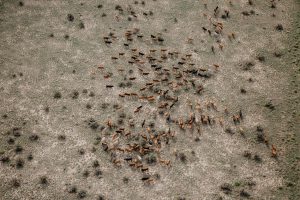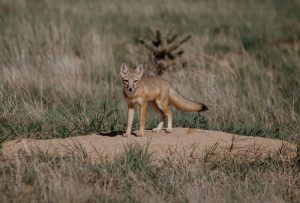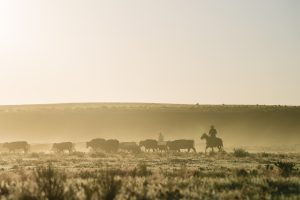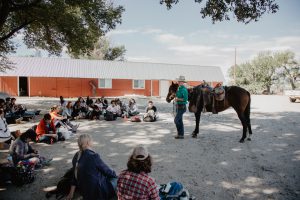I met with Tess Leach at Chico Basin Ranch, a cholla-covered 87,000 acres framed by distant blue peaks, where Ranchlands is headquartered. She drove me around the bumpy ranch roads as I peppered her with questions about Ranchlands’ work and mission.
Tess is the daughter of Duke Philips, who founded Ranchlands. Now the Director of Business Development, Tess lives out on the ranch along with her young family. “We just love it here,” she said.
“Ranchlands believes that “ranching is the best alternative to large-scale conservation, because ranchers livelihood depends on the health of the land. It’s in our best interest to have a healthy landscape.” Currently, they manage four ranches, in Colorado, New Mexico, and South Dakota . At each location, they develop diversified businesses that reflect that values of the land to make the ranch financially sustainable. At Chico Basin, a guest program, hunting and fishing program, leather shop, and an education program are their primary ventures alongside the cattle operation. “Education really is the pivot point for everything we’re doing, and all these different businesses are different avenues for people to get engaged,” said Tess.
Through public engagement, Ranchlands seeks to change the public’s understanding of ranching and demonstrate how ranching practices can be utilized for environmental conservation. “Core to our mission is to change the perception of ranching, which historically has been viewed as mining the land, a really closed off industry, antagonistic with conservation. Without engaging the public, then it’s going to continue to be misunderstood.” Ranchlands doesn’t just produce physical products like beef and bison meat, they are also social producers, creating conversations and bridging social and geographic divides.
 One of the myriad ways they seek to include the public is through an open-gate policy. This means anyone and everyone is welcome on ranch land “24/7, 365.” All they ask in return is that if a gate is closed, you make sure to close it behind you. I asked Tess if they ever had problems with putting so much trust in the public, and she laughed, “We get a lot of questions about it, and a lot of ranchers think we’re really weird for doing it. We’ve had this policy for nearly 20 years now and I think we’ve had one issue. It’s been really successful.” This policy points to Ranchlands’ overall ethic of hospitality and inclusivity, which invites in everyone, even people and organizations not traditionally associated with the industry.
One of the myriad ways they seek to include the public is through an open-gate policy. This means anyone and everyone is welcome on ranch land “24/7, 365.” All they ask in return is that if a gate is closed, you make sure to close it behind you. I asked Tess if they ever had problems with putting so much trust in the public, and she laughed, “We get a lot of questions about it, and a lot of ranchers think we’re really weird for doing it. We’ve had this policy for nearly 20 years now and I think we’ve had one issue. It’s been really successful.” This policy points to Ranchlands’ overall ethic of hospitality and inclusivity, which invites in everyone, even people and organizations not traditionally associated with the industry.
At Chico Basin, the land demonstrates the potential of ranching-as-conservation. Tess stopped the car to point out Chico Creek – a dark, lush thread that winds its way through the whole of the property. “When we first got the lease, that was just a trickle going through,” said Tess. But through careful cattle management and strategic grazing practices, they’ve been able to restore the creek. “We used the cattle, their hoof disturbance, and their manure to fertilize and to rehab it and now it’s it’s a thriving ecosystem. There’s reeds and rushes, there are frogs, there’s even some willow down there. It’s totally different from what it was before.”
Another example of Ranchlands’ approach to conservation came up as we drove past a prairie dog town. “Central to our mission is living in harmony with nature, not competing with it,” said Tess. “We don’t kill predators, we don’t poison prairie dogs, or vaccinate for certain diseases in the cattle. But rather, we try to make the land and our herds as strong as they can be naturally.” She pointed out three grey mounds of piled sticks; “those are coyote blinds.” At Chico Basin, they call upon natural predators to help them regulate the prairie dog population, instead of poisoning or shooting them. “The idea is to help nature fend for itself.”

They primarily raise Beefmaster cattle, a breed that originated from the Lasater Ranch and are purposefully bred to thrive on natural rangeland. As their website describes, “We do not shoot coyotes, but sell the cow who loses her calf because other cows were able to defend their calf. We do not use wormers or pesticides, but instead sell any animal that becomes anemic due to parasites. When heifers calve, we keep only the ones that had no difficulty calving. We do not breed for color or shape, but let the natural elements dictate which animals will leave the most progeny behind.” These breeding tactics ensure that Chico Basin’s cattle live in good health in harmony with the land, minimizing the need for human interference.
Ranchlands seeks to combine environmental sustainability with economic sustainability. “We say that conservation is a product that we produce, just like beef. And we think there may actually be a market for that in the future,” said Tess. “ When we are evaluating our business, a healthy landscape is right up there with a healthy cow. And that goes all the way from what you see- healthy grass, prairie dogs, songbirds, amphibians to a healthy ecosystem underneath.”
Chico Basin doesn’t sell their meat direct-to-consumer, but through Lasater Grasslands Beef, which you can find in locations throughout Colorado. All their cattle are processed by hand at two small, family-owned facilities in a conscientious manner, so you know that the animal you’re eating has been handled with respect throughout its entire lifetime.

While their cattle operation remains the heart of Chico Basin, diversifying business is a standard of Ranchlands’ management style. Tess drove me down to “the camp,” where they host guests for 8 week-long experiences ranging from horsemanship to photography and art. “There are so many different ways of encouraging engagement,” Tess explained. With their varied business structure, Chico Basin also fosters partnerships with people and companies outside the ranching industry. For the camp, a picturesque cluster of canvas tents by the creek, they worked with the Denver Tent Company, Filson, and Grizzly Coolers. When I stopped by the leather shop later on, they were busy fulfilling an order for Filson—beautifully hand stamped leather beer coozies.

In addition to such commercial partnerships, Ranchlands is in constant collaboration with conservation groups like the National Park Service, the Nature Conservancy, and the National Resources Conservation Service. On our drive, Tess pointed out the car of a bird-watcher who frequents Chico Basin, saying, “We have a banding station and a partnership with Bird Conservancy of the Rockies, and the education program that we have with the school kids is really based around that, they band migratory songbirds. It’s one of the hottest birding spots in Colorado.”
These kinds of collaborations are essential to pushing Ranchlands’ innovative approach. “We try to look at things with a fresh perspective all the time. It can be easy to do things the way you’ve always done them, the way your dad did, and your grandpa did before that. We try to keep a very open mind, and a lot of times that’s furthered through engaging with non-traditional partners.” These mutually beneficial partnerships help them to engage with many different kinds of people and to learn from a wide variety of perspectives. “We feel like we’re always learning,” said Tess. “And we all feel like that, from my Dad all the way down to the intern that started yesterday. We’re very open to change, and that flexibility is central to who we are.”
Along this same vein, Ranchlands hosts an annual concert at Chico Basin in the summer and an Art Show in Denver in the fall. Like Ranchlands’ other collaborations, these events “are ways to further the conversation and give us a new perspective.” The Art Program initially began as another way for Ranchlands to raise funds – Tess’ father Duke was trying to make the lease payments on their first property and needed to get creative. “My mom helped start the program, and with my dad they started getting relatively well-known Western artists out to the ranch,” said Tess. As it went on, it took on a life of its own. “It’s about creating a conversation. What we call a pasture, an artist calls a landscape. It’s another way to continue the conversation and share the work and engage people that might not otherwise be engaged with ranching.”

This year for the summer concert, Ranchlands is bringing out Colter Wall, a folky, bluesy, americana-style singer-songwriter. One of the openers, Frankie, from Frankie and the Boys, has been a long-time employee and friend at Ranchlands. Tess is looking forward to the show: “It’s a great family-friendly event. It’s all outside, rain or shine, camping, BYOB. It’s a really fun.” As I nodded in agreement, Tess pressed, “So are you gonna come?” If that sounds like a good time to you too, grab your tickets here! All proceeds support the Chico Basin Education program, which brings school kids out to the ranch to learn about ranching and conservation, at no cost to them. If you’re interested in participating in Ranchlands’ other events, from hiking to painting workshops, take a look at the calendars for the Chico Basin and Zapata ranches, both located in Colorado.
From their sustainable practices to their work with public engagement and education, so much of Ranchlands’ work aligns with our own mission and values and Slow Food Denver. I came away from my visit at Chico Basin feeling refreshed and hopeful – just imagine how our Colorado communities and landscapes might look like if more organizations shared their outlook! There are many, many amazing farmers, ranchers, and growers in Colorado and we encourage you to support them when and how your lifestyle allows.
Written by Eliza Guion, Summer 2019 Communications & Social Media Intern

0 Comments